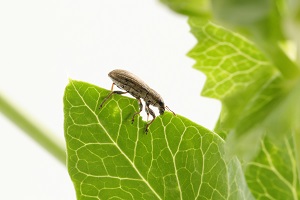
Pests can be a huge problem when growing a plant of any kind. Imagine you’re a farmer and your crop is at the mercy of insect pests. What do you do?
Applying pesticides to kill insects is one option. It is expensive, weather sensitive and can kill the good insects (known to farmers as “beneficials”) in the crop too. If only there was a way to consider the pros and cons of spraying pesticides at any given time. Wait, there is!
Integrated pest management (IPM) is an all-encompassing approach to pest management in agriculture. It uses a combination of pest management tactics and is more environmentally friendly than relying only on pesticides. And it can be cost-effective for farmers. Scientists have developed a series of thresholds and monitoring methods to decide when and how to best handle pest problems. According to Jennifer Otani from Agriculture and Agri-Food Canada’s (AAFC) Beaverlodge Research Farm, “using IPM is also important because it helps to protect beneficial insects such as predators, parasitoids and pollinators.”
AAFC scientists: Leaders in IPM research
At the upcoming 10th International IPM Symposium in March 2022, two International IPM Achievement Awards will be presented to AAFC researchers to recognize their outstanding contributions to IPM research.
Prairie Pest Monitoring Network: Collaboration and communication are key
The Prairie Pest Monitoring Network (PPMN), co-chaired by AAFC’s Dr. Meghan Vankosky in Saskatoon and Jennifer Otani, will receive the International IPM Award of Recognition for IPM Teams.
The Prairie Pest Monitoring Network is federally led. It depends on:
- collaboration from provincial governments
- industry
- academia and,
- farmers.
The network collects and synthesizes pest and beneficial insect data from field crops from across Manitoba, Saskatchewan, Alberta and the BC Peace region.
“Using models, we provide weekly updates on insect development during the growing season. We promote the importance of scouting for insect pests and using economic thresholds to protect populations of beneficial insects,” says Dr. Meghan Vankosky.
Initiated nearly 25 years ago by AAFC’s now retired Dr. Owen Olfert, the network shares knowledge generated by the entomological community. The network unified provincial efforts with consistent protocols for insect sampling and data reporting.
The long-standing collaboration was one of the key points in their win, according to Shaku Nair, of the University of Arizona and co-chair of the IPM Symposium’s awards committee. “The collaborations created a network to cover a vast territory and make a real impact in changing the deep-rooted culture of how field crops were grown in the Prairie provinces,” notes Nair.
They clearly communicate their findings and recommendations with end users, mostly, farmers. Through industry groups and other partners, they help farmers to scout for insect pests at the right time and places, making the informed pest management decisions. They make information useful:
- regular blog updates,
- risk maps for different insects
- field guides and,
- Twitter chats.
Dr. Charles Vincent: A long career in alternative insect management methods
Saint-Jean-sur-Richelieu Research and Development Centre’s now retired Dr. Charles Vincent was recently awarded the Lifetime IPM Achievement Award of Excellence. He had a career spanning over 30 years.
In 1983, Dr. Vincent began his research career with AAFC with the to discover alternatives to chemical insecticides for managing fruit pests. A cutting-edge idea several decades ago, it was not as popular as sustainable development is today.
Focused mainly on apples, blueberries and grapes, Dr. Vincent’s research has been instrumental in developing and commercializing biopesticide products. His discoveries in alternative insect management continue to make a big difference in limiting insecticide residues in the environment.
Dr. Vincent is known for his knowledge sharing: everything from writing the first French book in on biological controls, to publishing hundreds of research papers to mentoring and supervising dozens of students.
Cheers to our AAFC researchers for their award wins, and huge thanks to all IPM experts around the world for giving farmers a better idea of how to handle both the good and bad insects in their crops, which can save them money and help the environment.
View the video that explains more about how insects can be good, bad and useful (video).
Get more Agri-info
- Want more stories like this? Explore what else Agri-info has to offer.
- Interested in reporting on this story? Contact AAFC Media Relations at aafc.mediarelations-relationsmedias.aac@agr.gc.ca to arrange an interview with one of our experts.